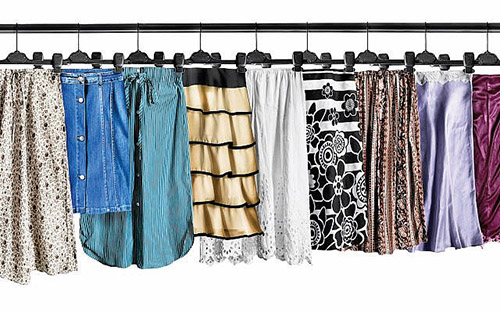
In 12th grade, when I told my father I wanted to attend a midrasha in Israel for a year before enrolling at college, one of the first things to pop out of his mouth was, “Are you sure you want to do this? You’ll have to wear skirts for another year.”
Skirts were the tip of the iceberg representing anti-feminist ideals I perceived as existing in Orthodoxy. I hated skirts and I repeatedly and emphatically vocalized this hatred; my parents knew that I looked forward with great anticipation to the day when I could finally discard my school skirts. For most of my life, skirts had represented an oppressive, restrictive, humiliating hindrance. I wore skirts at school because I had to, but at home and on weekends I’d wear pants.
At school, almost everyone wore a short black skirt, with little variation (regardless of the actual skirt length mandated in the institution’s dress code). The height of mortification was when a teacher forced a girl to change out of her too-short skirt and into a long, ugly one—intended to teach her some sort of lesson, though it’s unclear if anyone ever learned anything other than how to avoid the administration. I viewed this approach as toxic and sexist, and it turned me off toward the seminary scene in Israel.
To me, skirts had always been a prison; now, I was prolonging my sentence by choosing to attend midrasha. It didn’t make sense to the people who knew me, but what really shocked them was how, as coronavirus swallowed the end of my gap year and everything dissolved into chaos, my skirts lengthened.
I’m aware of both the positive and negative connotations of the process of “flipping out” and was hyper-aware of the fact that people were judging me as my necklines rose, my sleeves extended further and my skirts always passed my knees. Yet I did it anyway, despite many of the people in my life probably assuming that I was now less feminist, or somehow complicit in my own oppression.
The problem was never the concept of tzniut so much as its implementation: feeling judged by my teachers if my skirt was too short and by my peers if it was too long; people staring at my knees as if their presence trumped any sort of “personality” I could bring to the table. The problem was that I lost a sense of identity and a personal relationship with my body when I lost the right to control what was and wasn’t seen. The cage was not the skirts, but the lack of freedom and the ever-present judgement.
This was one of the reasons why I chose my seminary, Amudim—because, throughout my journey of self-discovery regarding tzniut while attending Amudim, I was never judged or shamed for what I was wearing. I was able to exist comfortably as myself, and only then, as time went on and I slowly began shedding the angst that had been inflicted on me after years of being judged for my outfits, could I approach the topic of tzniut in Judaism in a healthy manner.
When everything shut down due to the virus, I chose to remain in Israel, quarantined with five other girls from my midrasha, and during this time I began studying tzniut on my own and learning about it from a fresh perspective. I realized I’d misjudged it; it was not about hiding my entire self so much as a rule against exposition, and over the course of my studies I discovered it to be sensible, fulfilling and even artful.
Before I traveled to Israel, my vision of tzniut was someone clad in long, frumpy clothes; yet when I arrived, I found outfits that were fashionable, elegant and modest to boot. I realized that there was beauty as well as comfort in censoring my body and keeping things hidden, that not everything needed to be exposed and shown to the world—and I discovered this through my own journey.
I feel more free now in my longer skirts than I ever did in pants, more myself when I’m not constantly on display. I move through the world controlling how people perceive me. Tzniut, once a source of shame and humiliation, became beautiful and empowering when I approached it from my own angle instead of a “one-size fits-all” lens.
The reason I “frummed out” was because I was finally given a choice, as well as the tools to make that choice on my own. No one was judging or pressuring me—my midrasha simply provided me with books and information to make my own decision, and to me, that is feminism.
Brooke Schwartz is a former Jewish Link intern and resident of Englewood studying at Midreshet Amudim in Modi’in, Israel for her shana bet year.










